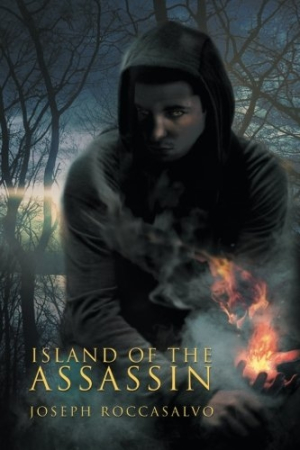Island of the Assassin
As a quick thriller with fascinating religious elements, Island of the Assassin snares interest and rushes relentlessly toward surprising conclusions.
In Joseph Roccasalvo’s Island of the Assassin, a curious priest becomes the confessor to a man with a dark past, setting off a harrowing chain of events. Elegant prose and swift pacing make this thriller easily consumable.
Father Peter Quince vacations to Italy after finalizing his latest novel, The Thirteenth Floor. The trip is meant to give him space to relax, and he loses himself in Tuscan scenes and Medici myths. But he also befriends a lonely widower, and this once stranger’s affection for him has wide implications. Back home, he receives word that his new friend has died, leaving Quince the whole of his estate, including a large Italian island. The gift is not without strings, though, as one of the island’s tenants is a ruthless CIA assassin, Kai.
But Kai has become troubled by his lethal activities, and uses his new connection to the priest as a means of exploring whether there’s ever an acceptable reason to take life. Supposedly bound by secrecy because of his vows, Quince carries the revelations Kai imparts with a troubled heart, and refuses to divulge them even under the most severe pressures. As Kai buckles under CIA manipulation, pressed to take out just one more Muslim terrorist, Quince struggles to offer the young man a means of redemption.
The philosophical and theological questions at the heart of Island of the Assassin provide the novel’s most fascinating moments, even if Kai is not eligible for the varieties of absolution that Quince ultimately offers him. Questions of whether a person can justify killing killers loom, and Kai’s related distress is extremely affecting. The refinement of Quince’s word choices make for smooth, even soothing, transitions, and are a nice touch, particularly when juxtaposed to to the often disturbing subject matter he reflects upon. Sometimes word choices from secondary characters are a little too elevated—“iridescent cleric” coming from a CIA head sounds out of place—but consistency of tone stands to earn appreciation.
However, some of the novel’s movements veer toward the surreal or incredible: Quince’s easy and considerable literary successes; an improbable release from the vicious clutches of spies. Both Kai and his love interest are uncommonly beautiful; the burdens that Kai carries almost defy comprehension. The ending, too, is a little too neat. However, if the novella can be approached as a gothic story, which some of its eerier elements do make room for, these departures from the believable may be excused, even appreciated, though they do sometimes require a leap.
As a quick thriller with fascinating religious elements, Island of the Assassin snares interest and rushes relentlessly toward surprising conclusions.
Reviewed by
Michelle Anne Schingler
Disclosure: This article is not an endorsement, but a review. The publisher of this book provided free copies of the book and paid a small fee to have their book reviewed by a professional reviewer. Foreword Reviews and Clarion Reviews make no guarantee that the publisher will receive a positive review. Foreword Magazine, Inc. is disclosing this in accordance with the Federal Trade Commission’s 16 CFR, Part 255.

